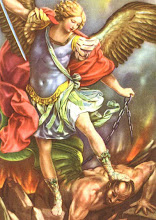
SHAVUOT 5769
evening May 29 through night May 30 of 2009
The Festival of Shavuoth celebrated on the 6th and 7th days of Sivan, begins this year on evening May 29, May 30.
This Holiday is known by several names: It is called Chag Shavuot, Festival of Weeks, concluding 7 weeks since Passover, and the Giving of Torah (Z'man Matan Torateinu), Festival of the First-Fruits (Chag HaBikurim), and Festival of the Harvest (Chag Hakazir).
Shavuot commemorates the Revelation at Mount Sinai 3,314 years ago when G-d gave Israel the Holy Torah, including the Ten Commandments and the 613 Mitzvah Observances.
At Sinai, the Jewish people were charged with the privilege and responsibility to be a "Light to the World." The Shavuot holiday is alive with flowers and greenery, highlighted by Torah study, and flavored with the taste of milk and honey.
Timeless Torah
The Torah is not a mere collection of human knowledge that is subject to revision. The Torah represents Divine laws and immutable universal guidelines that have been tested by the Jewish people over several millennia in every country and culture throughout the world.
Torah provides a framework for daily living based upon the most authoritative moral code. The Torah is a precise and eternal yardstick against which to measure our deeds and lifestyles.
Hearing the Ten Commandments
The Ten Commandments combine two sets of relationships: Duties between man and G-d, and our duties from person to person.
Even children and infants should be brought to the Synagogue to hear the Ten Commandments. Although they may not yet understand the words, yet their souls hear the message. It also demonstrates that the children are our Torah Guarantors.
The Children As Guarantors
Before G-d consented to give the Torah to the Jewish people, He demanded guarantors, who would assure and guarantee the Torah's continuity over the ages.
Initially, the Jews suggested other possible guarantors, from the patriarchs to the prophets, but G-d was not satisfied, until the little children were offered as the guarantors. Only Torah educated children serve as the true guarantors and transmitters of Torah for all time.
Floral Decorations
It is a Shavuot tradition to adorn the synagogue and the home with greenery, fragrant flowers, leaves, boughs and trees.
The greenery recalls the grass on Mount Sinai, when the Jewish people were commanded, "the flocks shall not graze at the foot of this mountain" (Exodus 34:3). Trees and branches also recall that Shavuot is a Day of Judgment of fruit trees, which we mention in our prayers.
During the offering of the "Bikurim" First Fruit in the Holy Temple on Shavuot, the horns of the leading ox were wreathed with luxuriant olive leaves, and the first fruit baskets were ornamented with wreaths.
The greenery also recalls how Moses was saved when his mother hid him in a wicker basket among the reeds by the Nile to escape Pharaoh's decree to drown Hebrew children (Exodus 2:1-3). This occurred on Shavuot, for Moses was born on the 7th day of Adar and three months later is the 7th of Sivan.
Roses are Shavuot favorites. The verse "The decree (dat) was proclaimed in Shushan (Esther 8:14) is interpreted 'the Law was given with a rose (shoshan).
A medieval book of customs states: "It is customary to scatter spices and roses on the synagogue floor to celebrate the festival." Beautiful paper flower cutouts called 'shevuoslekh,' 'reizelekh' or' shoshanta' were pasted on windowpanes facing the streets. Among the intricate designs of folk art creations were motifs and patterns relating to Shavuot and the Torah.
Milk and Honey
Certain Shavuot dairy culinary customs have evolved over the generations, and various reasons have been advanced for this tradition.
Dairy Foods
It is customary to eat dairy foods such as blintzes and cheesecake (why not some Kosher Pizza?) on Shavouth. Full Dairy courses can be served as the main holiday meal, or as a light snack followed by a traditional meat holiday dinner.
One explanation for eating dairy is that when the Jews received the Torah on Shavuot, they were not ready with utensils for kosher meat preparation, so they ate dairy, which is relatively easy to prepare instead of meat.
The Torah is compared to milk and honey. The verse "honey and milk shall be under your tongue" (Song of Songs 4:11) implies that the words of the Torah shall be as dulcet to your heart and as milk and honey are sweet to your tongue. David, King of Israel, declares "G-d's precepts Lord are sweeter than honey and the honeycomb" (Psalms 19.9-11).
Shavuot Holiday Customs
* On all Friday evenings and the evening preceding a Jewish holiday, women and girls usher in Shabbat and the holiday by lighting candles, and saying the proper blessing.
* All people, especially children, should hear the Torah reading of the Ten Commandments in the Synagogue on the first day of Shavuot (Friday, May 17).
* The Yizkor memorial prayer is recited for departed family members on the second day of Shavuot (Shabbat May 18) and charity is contributed (before or after the holiday).
* It is customary to stay awake on the first night of Shavuot. We read an anthology called "Tikkun Lail Shavuot" of selections from the full range of the Written and Oral Torah. On Shavuot we dedicate ourselves to increase our Torah study throughout the year.
Ladies First!
To assure that the Torah would be well received and perpetuated, G-d told Moses to first address the women: "Say to the House of Jacob" (referring to the women) was followed by "Tell the sons of Israel" (Exodus 19:3) (referring to the men).
Torah knowledge is also obligatory for women, so they can learn to know how to fulfill the Mitzvot and live a full Jewish life.
The woman influences her home and environment. It is the mother who primarily instills values in her children, encourages her husband to observe and study Torah, and affects others through her hospitality, warmth and teaching.
The Book of Ruth
Some communities read the Book of Ruth on the second day of Shavuot.
Ruth was a righteous convert to Judaism, who became the grandmother of David, King of Israel. Like Ruth, all of Israel underwent conversion when they received the Torah on Shavuot.
In the exceptional story of love, faith, dedication and devotion, Ruth says to her mother-in-law Naomi: "Where You go, I go...Your people are my people, Your G-d is my G-d" (Ruth 1:16).
King David
Shavuot is the Yartzeit of King David, composer of the Book of Psalms. The line of descent from King David will ultimately lead to the righteous Moshiach who will redeem us from exile.
The Baal Shem Tov
On Shavuot we also observe the Yartzeit of Rabbi Yisroel Baal Shem Tov, founder of the Chasidic movement, who revealed the inner secrets of the Torah. His teachings draw us closer to achieving the unity with G-d initiated at Mount Sinai, which will culminate in the final and complete Redemption, soon in our days!
Yizkor
On the second day of Shavuot,(May 30) as on Passover and Sukkoth, it is customary to recite Yizkor, a prayer in memory of a departed rel ative.
Keeping alive the memory of a beloved is a hallowed Jewish tradition. It reminds the living to reflect on the meaning of life, particularly Jewish life. We unite with the soul and spirit of our heritage, and strive to come closer.
During Yizkor we pause to look back to the past, and ahead to the future. We are links in a historic chain going back to Sinai. A chain is as strong as its weakest link. Are we holding on?
Yizkor focuses our attention on beloved parents and grandparents, not to their death, but to what they lived for. We don't want Judaism to die with them. Yizkor brings back memories of home. We remember good times and hard times, pain and struggle, love and faith.
The light of the Yizkor candle is more than a 24-hour flame in a glass. Its flicker expresses a verse in Proverbs: "The soul of man is the candle of G-d." As the flame reaches upward, so does the soul rise higher.
We want the warmth and spark of Judaism to remain alive in our hearts. When saying Yizkor we pledge money to charity - Tzedaka, affirming our love and bond through a Mitzvah. All of physical life is temporary.
Only a Mitzvah is eternal and lives on forever.
http://www.jewish-holiday.com/shavuos62.html



















Nessun commento:
Posta un commento